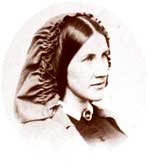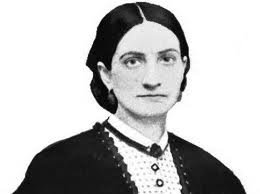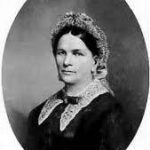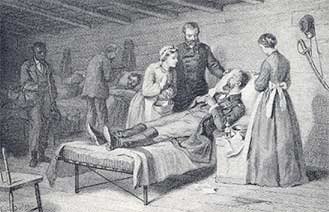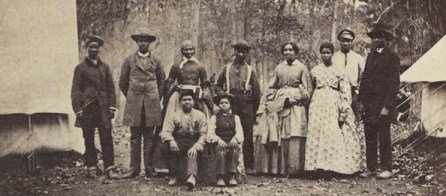Sophia McClelland was a Civil War nurse who was determined to go out onto the field of battle and retrieve the sick and wounded. In the autumn of 1861, she saw wounded soldiers lying near a train platform. She took them to a nearby hotel and brought food and blankets from her own home to help care for them. She enlisted the help of wounded soldiers to serve as nurses, because at times there were few nurses available.

Sophia McClelland
Sophia wasn’t afraid to challenge the male chauvinism that existed in the Civil War era. She was touched by the needs of the wound, and she was amazed at the ferocity with which she stood up for her patients. She should be remembered as one of the strongest patient advocates of her time.
In the early autumn of 1861, Sophia watched the regiments of soldiers that passed through Louisville, Kentucky, on their way “to points below on the Louisville and Nashville Railroad.”
She drove her carriage down to the depot, where she noticed several soldiers lying on the platform, and she thought some of them looked very ill. She had them taken to some vacant rooms over a warehouse nearby, then she rode home again. She soon returned with her carriage full of blankets, comforts, and pillows, then bought “provisions for the men’s supper, and candles to give them light for the evening.”
She later wrote:
This was the beginning, and the general impression seemed to be that in three or four months the trouble would be all over. But every day added to the numbers in the hospital. Regiments were continually marching through and leaving their sick; skirmishes were frequent on the Nashville Road, and there were those coming to be cared for who were disabled by wounds as well as sickness.
After the battle of Fort Donelson [February 1862], we took down a party of physicians and clergymen and six ladies as nurses, also a quantity of hospital stores from the sanitary rooms, for the use of the wounded and sick. The expenses of this company were borne by private funds.
Sophia and the others had to get passes from General William Nelson in order to care for the wounded within his lines. He refused to see her and those in her party, even though they were recommended by his friend, Dr. Robert Murray, the medical director of the department.
I decided to make a personal appeal, although any friends made every effort to dissuade me, using for argument Nelson’s ungracious speech and gruff manners. He was sitting at a table at one end of the long parlor of the hotel. I approached him, supported on either side by my friends, the two gentlemen with whom he had had an interview only a few moments before.
General Nelson was a man of commanding presence; he seemed not only tall but very large. He had black hair and eyebrows, with piercing eyes, which he bent on me from the moment we passed the sentry at the door. Indeed, his countenance was fierce and forbidding as if to intimidate.
After the introduction, he said, “Madam, can you tell me what you want?”
“Yes, general, I have come to ask you for passes for my little company within your lines; we desire to reach Fort Donelson. You have already been made acquainted with the object of our errand, healing the sick and wounded soldiers of Kentucky where they may have the attention necessary for their comfort and recovery.”
“That is all very well, madam, but we have no place for ladies,” said the general.
“General,” said I, “we have not come to be entertained, but on a mission of mercy. All we ask of you is transportation and liberty within the lines to take care of our wounded.”
“But, madam, there are no conveniences, no rooms you can occupy. All these boats you see coming down the river are filled with soldiers, besides officers and crew.”
There followed a long pause, during which General Nelson glared at Sophia.
He finally said, “Well, you are a determined woman, and the first one I ever saw who knew what she wanted, and could tell it in a few words.”
The general eventually invited Sophia’s party to be seated. He whispered to his secretary, who wrote something on a piece of paper, placed the paper in an envelope, and rang a bell. An orderly came in and handed the envelope containing the passes to Sophia.
Sophia and the others arrived at Smithland, Kentucky, but couldn’t get a boat or any other vehicle to take them to the fort. People were suspicious of them. Some thought they might be spies. They couldn’t buy food,
and no one would give them shelter. At, last they boarded the government boat, Silver Moon, and shortly reached Paducah.
General William Tecumseh Sherman was then at Paducah. Sophia reported to him for duty and received orders to go to Mound City and Cairo, and to take all soldiers from the hospitals there and leave them at the points nearest their lines.
This would make place for others who were expected soon, as a battle seemed impending. He also directed us to draw commissary stores at Cairo, and report on our return to Paducah, where we would then take aboard all the wounded prisoners for whom we could find place.
“And now, my dear madam,” said General Sherman, “I desire to say to you that the prisoners are to receive the same attention as our own men; no distinction is to be made in the management or treatment of the prisoners by the surgeons or nurses.”
But they had to wait for boats to carry them to the wounded. For two days, they did what they could to help the local citizens and Union surgeons at Paducah.
I was becoming impatient and restless in waiting, therefore determined to take the boat that first arrived, and trust to chance to have the other one overtake us. We brought on board about sixty prisoners; half of them were wounded men, the others were suffering from the effects of measles and colds from exposure. They coughed almost incessantly, and there was not an ounce of opiate or sedative to be found this side of Cairo.
It was in the evening and nearly dark when we reached Cairo. We had very few provisions and our needs were extremely pressing. In order to get our order on the commissary honored, it was necessary to report at headquarters at once. Then, to make matters still more desperate, our boxes of sanitary stores. containing bedding, clothing, and bandages, had gone astray; we had been placed in such straits for the bandages that some of us had taken our underclothing and torn it into strips to bind up the wounds of the suffering soldiers.
A long line of cars from Chicago had just come in, and for fifty minutes continued drilling back and forth until it was quite dark. There were no lamps or lights on the wharf, save here and there what seemed a flaming torch of some resinous substance which only partially lighted all the vicinity.
As soon as the cars stopped long enough, I climbed through and over them to the other side. The mire was knee deep. At every step, I was obliged to extricate one foot before I could plant the other down. I lost one congress gaiter in the mire, and was obliged to present myself at headquarters with one shoe on and the other foot covered with a badly soiled stocking. I received a pair of heavy army shoes, and endeavored to hunt up the representative of the Sanitary Commission of the Northwest. I worked all that Sunday morning.
Crowds assembled at the wharves of the several towns as our boats passed. and we were greeted with cheers. Deputations of ladies were allowed to come on, who brought many needed delicacies — milk, fresh. butter, and home made biscuits. Oh, what a feast it was for the wounded and sick when the ladies distributed it to all. Federal and Confederate alike!
Surely it was a picture worthy of the skill of an artist of the realistic school. On reaching Louisville the military authorities took charge, and the sick were removed to the different hospitals.
SOURCE
With the Army of the Cumberland
-from Tales of the Civil War, Edinborough Press, 2005


